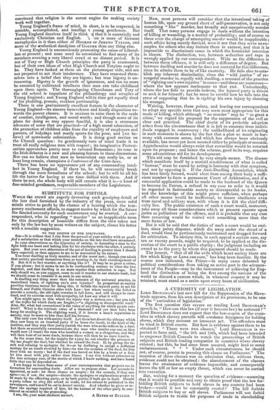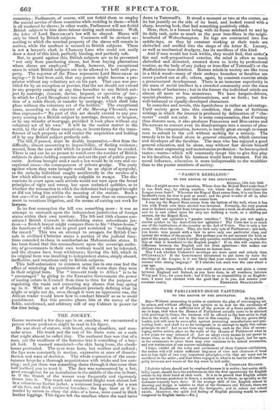A CURIOSITY OF LEGISLATION.
LORD BROUGHAM'S last new bill for the Suppression of the Slave- trade appears, from his own description of its provisions, to be one of the " curiosities of legislation."
The first question that occurs on reading Lord BROUGHAM'S speech is, " How can this law (if ever it become law) be enforced ?" Lord BaovduAar does not expect that the law-courts of the coun- tries in which slavery prevails will condemn foreigners for holding slaves, which they account an innocent act. The offenders must be tried in British courts. But how is evidence against them to be obtained ? " There were two clauses," Lord BROUGHAM is re- ported to have said, " the 9th and 10th, which had been intended to empower British Consuls to watch the proceedings of British subjects and British trading companies in countries where slavery existed ; but this, he had since been assured, might lead to some embarrassment. * * * Under such circumstances, he should not, of course, persist in pressing this clause on Parliament." The insertion of these clauses was an admission that, without them, evidence could not be obtained : the abandonment of the clauses leaves the attainment of evidence impossible, and consequently leaves the bill or law an empty threat, which can never be carried into execution.
But, waiving for a moment the question of evidence—assuming that it would be possible and easy to obtain proof that the law for- bidding British subjects to hold slaves in any country had been broken—would it not be constantly evaded? The bill forbids British subjects to buy or sell slaves. Parliament will not forbid British subjects to reside for purposes of trade in slaveholding
countries : Parliament, of course, will not forbid them to employ the menial service of those countries while residing in them—which is all tendered by slaves; in other words, Parliament will not forbid
British subjects to hire slave-labour during such residence. Well, the letter of Lord BROUGHAM'S law will be obeyed. Slaves will only be hired by British subjects. Contracts will be devised ac-
cording to which the nominal property of the slaves will remain in natives, while the usufruct is secured to British subjects. There is not a lawyer's clerk in Chancery Lane who could not easily draw a deed of this kind, perfectly binding, and perfectly safe.
But, to guard against this, British subjects are to be prevented " not only from purchasing slaves, but from buying plantations where slaves are employed." Mark, however, the exceptional cases in which British subjects are to be allowed to hold such pro- perty. The reporter of the Times represents Lord BROUGHAM as saying—" It had been said, that any person might become a pro- prietor without any voluntary act on his part. That case was pro- vided for by an exception or proviso, that the act should not extend to any property coming at any time hereafter to any British sub- ject by marriage, descent, devise, bequest, or operation of law ; to which he (Lord Brougham) was disposed to add, at the sugges- tion of a noble friend, or transfer by mortgage, which shall take place without the voluntary act of the holders." The exceptional cases, according to the reporter of the Morning Chronicle, were thus expressed—" No part of this act should extend to any pro- perty coming to a British subject by marriage, descent, or bequest, or by any transfer of mortgage, provided it took place without any voluntary act of his own." It will be the easiest matter in the world, by the aid of these exceptions, to invent forms for the trans- ference of such property as will render the acquisition and holding of it by any British subject perfectly safe.
The bill, if passed, must be doubly inoperative,—first from the difficulty, almost amounting to impossibility, of finding evidence; second, from the ease with which its penal clauses may be evaded. There is and can be no person to watch over the conduct of British subjects in slave-holding countries and act the part of public prose- cutor. Actions brought under such a law would be in rare and ex- ceptional cases—the consequences of private grudge. The party against whom they were brought would be an object of sympathy, as the unlucky individual caught accidentally in the meshes of a law which allowed so many equally culpable to escape. The dis- cussions in court upon such actions would not turn upon the broad principles of right and wrong, but upon technical quibbles, as to whether the transaction in which the defendant had engaged brought or did not bring him within the meaning of the statute. Such a law can—if at all operative—be nothing more than an encourage- ment to vexatious litigation, and the means of cutting out work for lawyers.
In its first conception the bill was something more : it was an attempt to encroach upon the independent jurisdiction of foreign states within their own territory. The 9th and 10th clauses con- stituted British Consuls in slaveholding states subordinate jus- tices—a Scotch lawyer might compare them to his "Outer-house," the functions of which are in great part restricted to " making up the record." This was an attempt to arrogate for British Con- suls in civilized Christian states a portion of the judicial func- tions conceded to them in semibarbarous Mahommedan states. It has been found that this encroachment upon the sovereign autho- rity of governments in their own territory would not be tolerated, and the clauses have been withdrawn ; leaving the bill, which in its original form was insulting to independent states, simply absurd, ineffective, and vexatious only to British subjects.
This half-submission to common sense has in one case had the effect of rendering the provisions of the bill worse than they were in their original form. The " innocent trade to Africa" is to be " encouraged" by giving to the Executive Government the power of issuing orders in Council from time to time for the purpose of regulating the trade and correcting any abuses that may spring up in it.. With an act of Parliament precisely defining what he might or might not do, even though it were an oppressive one, the African trader would know how to conduct himself so as to avoid punishment. But this proviso places him at the mercy of the fickle, uninformed, and arbitrary will of any Cabinet in power for the time being.



























 Previous page
Previous page